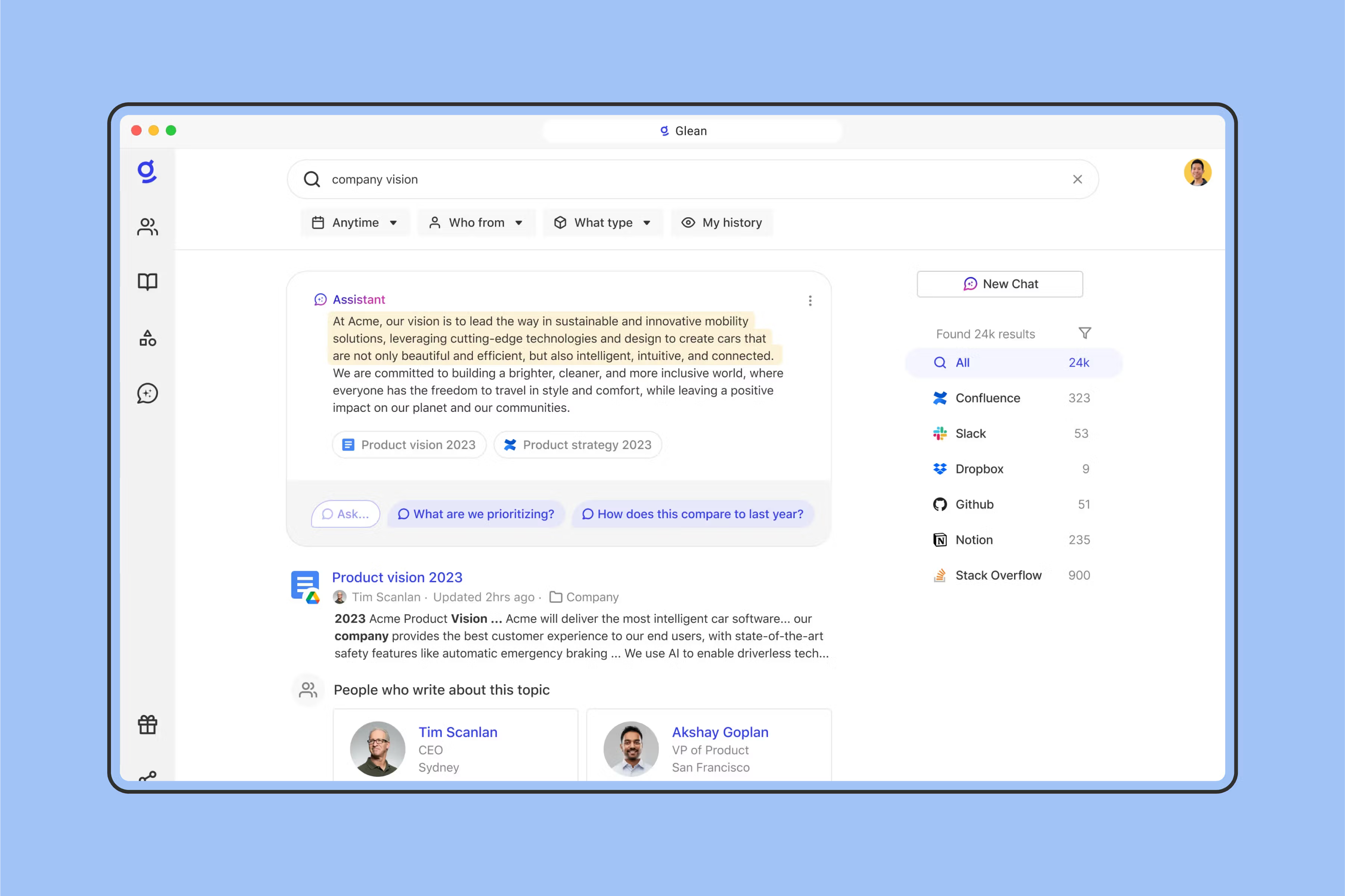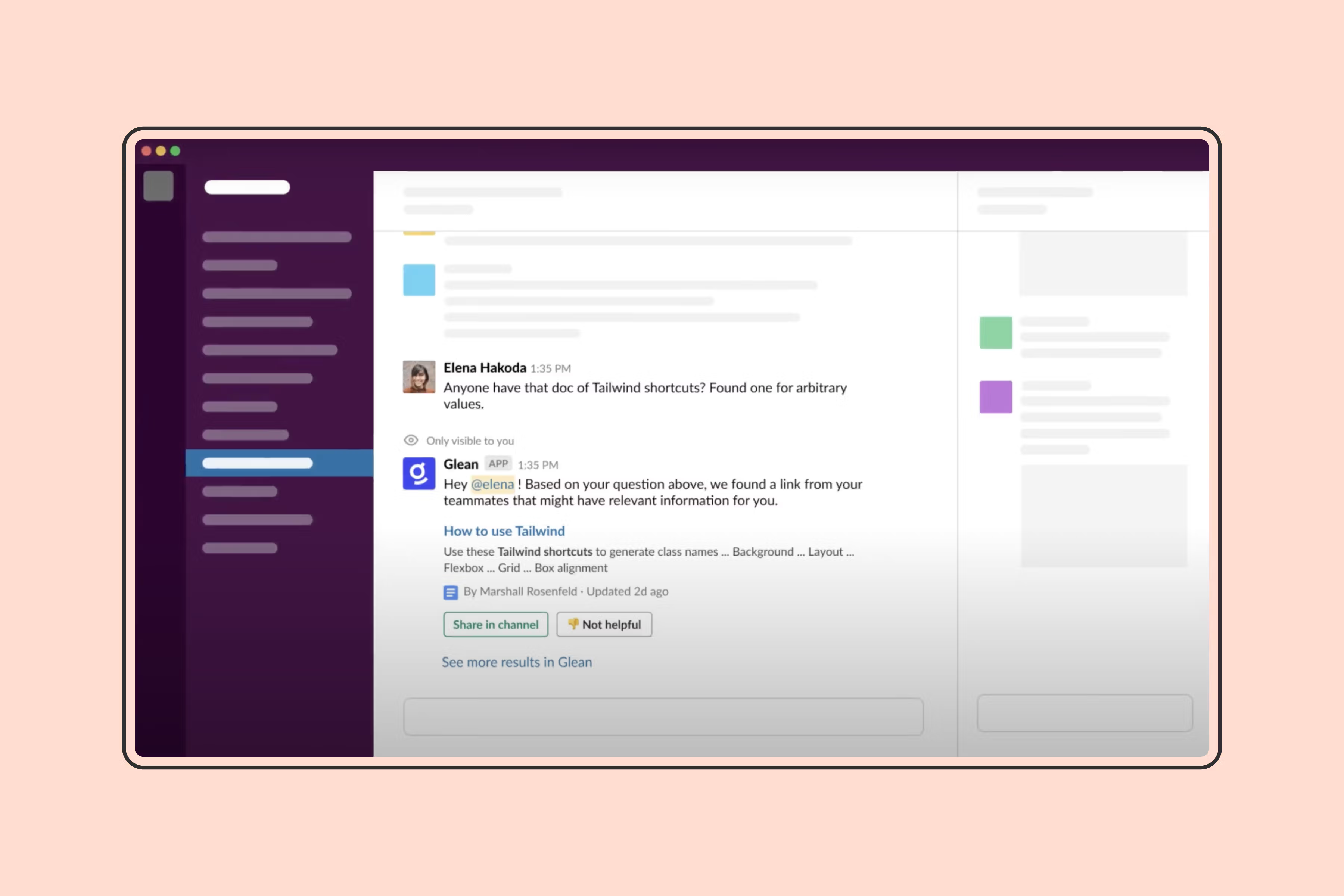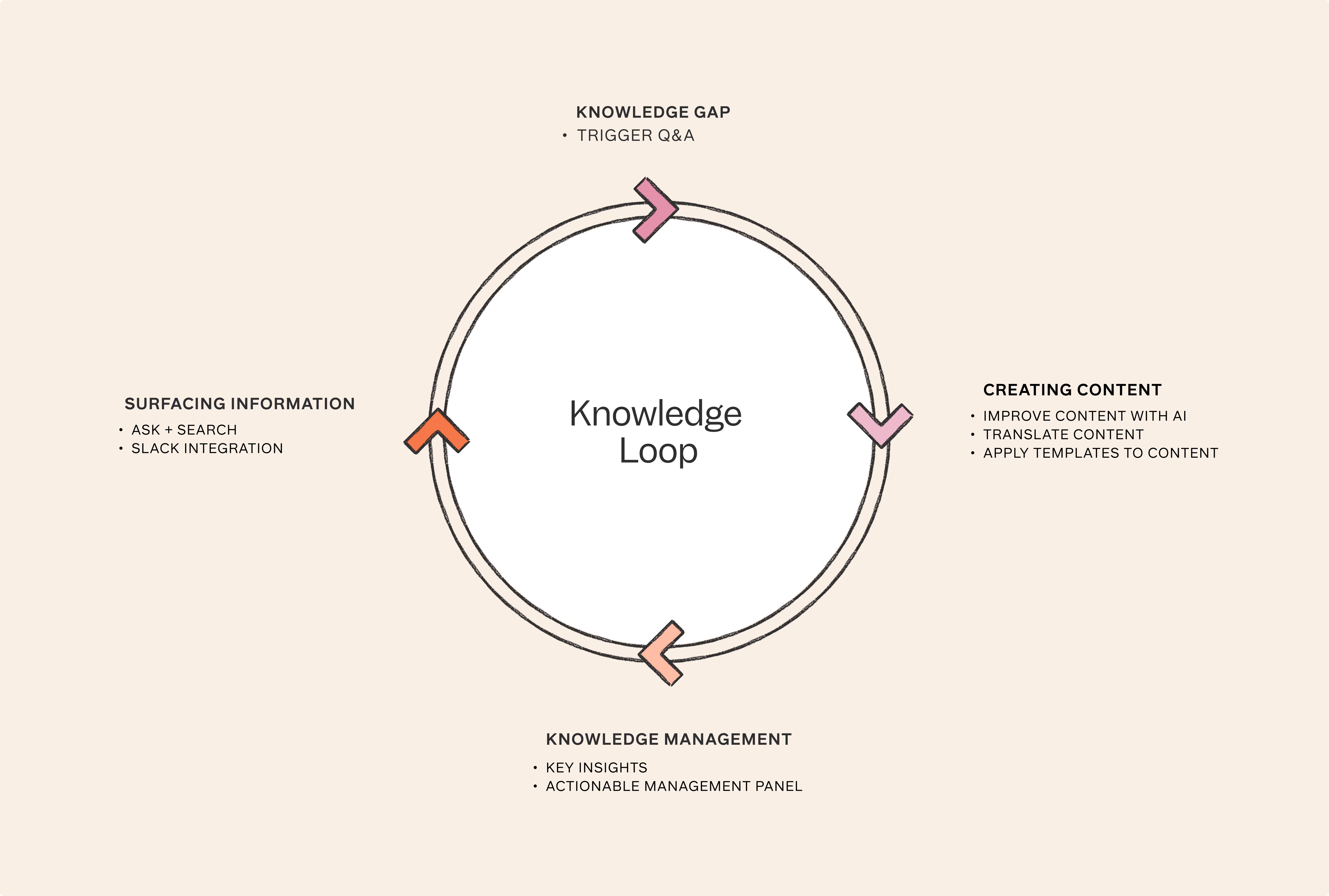Remember that crucial project update buried deep in your email threads? Or the onboarding document a colleague sent weeks ago that seems to have vanished? You can't just have a Google-like search engine for your company information.
Glean aims to solve this problem. It positions itself as a way to index and surface knowledge from all your work conversations, documents, and frequently used apps, making retrieval a breeze. No more frantic digging through cluttered inboxes – Glean wants to put the information you need right at your fingertips. Glean not only makes finding information easier but also significantly boosts productivity by streamlining the retrieval of important work-related information.
But does it live up to the hype? After researching Glean extensively and having a look at the reviews, I can give you a simplified breakdown. So continue reading to figure out what Glean excels at, and if it can really be the Enterprise Search your team desperately needs.
Understanding Glean: It’s more than just a Search Bar
Glean is an AI Enterprise Search tool designed to be the universal search for all your tools, documents, and conversations. It connects to the different tools, documents, and conversations within your team's digital workspace. By removing information silos and creating a central knowledge center, Glean helps your employees find the answers they need, when they need them, no matter where the information is stored.
The reason why people love it is - it creates a search engine-like UI for you to Google on your company knowledge. For every query you type, you’ll get a results page like this:

Glean goes beyond traditional keyword-based search. It uses AI, specifically Retrieval Augmented Generation (RAG), to separate the ability of large language models (LLMs) to generate responses from their ability to retrieve factual knowledge. This means Glean first retrieves information through a separate search system, then provides it to the LLM for reasoning and crafting a response. This approach ensures answers are grounded in accurate information, verifiable, and address issues of data freshness and permissions.
Key Features
Let's explore Glean's features that make it a great Enterprise Search solution:
Great Search
Glean's AI-powered search goes far beyond just matching keywords or document titles. It understands what your documents are really about. This means you'll get the most relevant information at the top of your results, even if you don't use the exact words that are in the document.
Contextual Relevance
Glean learns about how your team works and communicates. It uses this understanding to personalize your search results, taking into account your own work patterns and the relationships within your team. This ensures you get the information that's most likely to be helpful to you.
Integrations with 100+ inter-app connectors
Glean easily connects to many popular tools like Google Drive, Slack, Jira, and Salesforce. This lets it quickly gather and organize information from different sources. Importantly, it also understands who should have access to what – so only the right people can see the right files and conversations.
Glean simplifies the task of searching for old documentation, which was previously a tedious and time-consuming activity. While it’s time consuming to connect everything to get Glean’s full usage, it’s definitely worth it.
AI App Builder
This feature lets you create custom Q&A chatbots that can be used within tools like Slack. This gives your team a quick way to get answers from your company's knowledge base, saving time and making them more efficient.

API Access
Glean's Chat API lets developers easily add Glean's search capabilities to any application. This opens up a wide range of possibilities for creating custom tools and experiences powered by your company's collective knowledge.
Extended AI Access
Glean's Tools SDK takes things further, empowering developers to use its AI search for even more complex and automated tasks. Imagine Glean not only finding the answer to your question but also initiating follow-up actions based on the information it retrieved. This could include sending emails, generating reports, opening support tickets, or even updating project management boards – saving your team valuable time and streamlining workflows.
Newer Knowledge Features
Glean continues to evolve, and here are some of its more recent and noteworthy additions:
- Go Links: Inspired by o/slash, Go Links function as custom shortcuts for frequently accessed resources. Operations teams, managers, and anyone who needs fast access to specific links, documents, or tools will find this feature particularly useful. That’s why quicklinks are natively present in MacOS, iOS, and even productivity tools like Raycast and Alfred.
- Home Page: Glean's new home page aims to be the modern intranet for companies who want to give a more holistic employee experience. It helps you give your team a centralized overview of important updates, frequently used links, and other relevant company information.
- Collections: Collections are like shareable pages or folders where you can organize links, documents, and notes related to specific projects or topics. It’s essentially a share-able list of links that you can use to keep track of all project-related links in one place. This makes it easier to collaborate with colleagues and cut down on searching time.
We’re unsure of how useful this feature might be to your daily workflows. If you have a neatly maintained AI Knowledge Base like Slite, you can just organize every project’s documentation in one channel to cut the double-work. - Announcements: Send one-to-many announcements directly within Glean. Although similar features exist in communication tools like Slack or MS Teams, it’s inspired by classic intranet designs. The feature is still useful for companies who want to send regular updates to their frontline workers.
Limitations
Glean is a powerful tool for finding and using your company's knowledge. But it's important to understand its strengths. It might not be the ultimate solution for every single need, here’s why:
Only Search-Focused
Glean's core mission is to help you find the information you need quickly. It excels at digging through your existing documents, conversations, and tools. If your team already has a way to create documents, meeting notes, and detailed manuals, Glean will integrate seamlessly and help you find those resources much more easily.
Limited Knowledge Creation
You can’t write docs or do note taking within Glean. It doesn't have the same in-depth editing features or a WYSIWYG editor. Think of Glean as the expert librarian who knows where your knowledge is stored, rather than the primary author creating new books. If your team needs a central place for extensive document creation and collaboration, you'll likely need to use a dedicated tool alongside Glean.
Evolving AI Search
Glean's AI search is impressive but still in very early stages. It has trouble processing specific industry terminology, different languages, etc. With time and additional data, Glean can get smarter, but don't expect it to magically understand everything from day one. You’ll need to really use the inter-app connectors to integrate all your company information.
Potential Over-Reliance
A side note about Glean's powerful search: it's easy to become very dependent on its results. Remember, an AI draws from the information it's given. While helpful, Glean's answers shouldn't completely replace critical thinking, double-checking information, and applying your own expertise to new situations.
Glean's focus on search comes with trade-offs. By not trying to be everything, it's able to be extremely good at its core function – making knowledge searchable. Its API and developer tools take it a step further are designed to let you connect other specialized tools, bridging any potential gaps for a complete knowledge management solution.
As Glean tries to be the best Enterprise Search software, it leaves you to find other tools for creating docs and managing them. It severely limits the scope of Glean to serve a complete productivity solution. Being unable to search for information is a small part of a bigger problem faced by teams.
Most teams’ problem is that their Knowledge Loop is broken. The Knowledge Loop consists of 4 parts:

- Finding the Knowledge Gap within teams (based on Slack DMs to managers, threads, etc.)
- Creating knowledge (writing, designing, importing docs, etc.)
- Managing knowledge (updating obsolete docs, archiving and organizing the rest)
- Finding knowledge (searching a tool, asking a colleague, etc.)
Glean’s lack of Knowledge verification and Knowledge Management features make it a focused tool that make it a single source, but of unverified information. Because of its limitations, Glean might give you obsolete results from docs that are 3 years old. On the Knowledge Management front, there’s no way for teams to see which questions are going unanswered, and how many times are people finding the relevant information they need.
Best Glean Alternatives
Glean isn't the only solution for tackling knowledge management challenges. Several excellent alternatives offer a different mix of features and approaches. Let's take a closer look at a few of the top contenders:
Super.work
Here's the thing about Glean - it's great at search but leaves you hanging on everything else. Super.work takes a different approach. Instead of trying to be your company intranet, it focuses purely on connecting all your tools into one AI search interface.
Ask "What's our API rate limiting policy?" and get answers from your knowledge base, recent Slack discussions, GitHub docs, and Linear tickets - all in one response with source citations. Super works where you already work (Slack, browser, anywhere) instead of making you visit another platform.
The key difference? Super doesn't try to replace your existing tools or create new workflows. It just makes finding information across all of them ridiculously fast. At $15 per user per month, it's typically more affordable than enterprise search platforms while solving the core problem - scattered information across multiple tools. Book a demo to see what Super can do for you.
Guru
Guru is another established player in the knowledge management space. It emphasizes capturing knowledge directly within the tools you already use via browser extensions. Guru prioritizes information verification, which can be a major pain point if your company struggles with outdated documents or conflicting information.
While its content creation tools are robust, they may feel a bit more structured compared to Glean's emphasis on connecting a wide variety of existing sources.
Coveo
Coveo is a mature enterprise search platform capable of indexing information beyond what's just within your company. It can connect to external sources like industry websites, research databases, and libraries. This flexibility makes Coveo a good option for organizations that need to incorporate a vast range of internal and external knowledge into their search solution.
However, its focus on a wider range of information might make it less suitable for companies primarily struggling with managing internal knowledge.
Key Considerations:
When choosing between Glean and its alternatives, consider these factors:
- Content Creation Needs: Do you primarily need help finding existing knowledge, or is creating new content equally important?
- Information Structure: How formal is your knowledge structure?
- Technical Expertise: Glean's API and SDK provide significant customization potential.
Pricing
Glean doesn't offer a free plan or a public pricing structure. This means you won't be able to try the full range of their features without a demo and discussion with their sales team.
Here's why understanding Glean's pricing might be a bit tricky.
Glean seems to tailor its pricing based on the size of your organization, specific needs, and the features you require. This customized approach can be beneficial if you need a solution that fits your company's unique knowledge structure and workflows.
Moreover, since the pricing isn't transparent, there's likely room for negotiation. Be prepared to discuss the challenges your team faces, the volume and type of data you'd like Glean to index, and your budget limitations.
During your demo with Glean, be sure to ask detailed questions about pricing, potential add-ons, and what's included at different tiers. This will help you avoid surprises and ensure the solution aligns with your budget.
Is Glean Right for Your Team?
Here's a quick checklist to help you decide:
- You'll love Glean if:
- Your team's valuable information is scattered across different tools and platforms.
- You find yourself wasting significant time searching for the same information repeatedly.
- You need a way to unlock knowledge hidden in emails, conversations, and messy document folders.
- You might need additional tools if:
- Your primary need is creating and editing extensive documents collaboratively.
- You want a highly structured, wiki-like knowledge base with a formal editing process.
- Your company doesn't already use the tools and platforms Glean integrates with.
Overall, Glean shows great promise in helping teams combat knowledge overload. If your team struggles with finding information within the tools you already use, Glean is likely worth a serious demo and discussion with their team to explore how it can transform your knowledge workflows.

